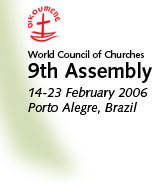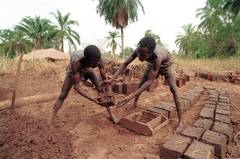 |
WCC > Home > News & media > News | ||||
| About the assembly | Programme | Theme & issues | News & media | |||||
 |
|
||||
|
16.02.06
Assembly calls for economic justice
by Stephen Webb (*) More articles and free photos at
The World Council of Churches Assembly, meeting at Porto Alegre, Brazil, has called for churches "to act together for transformation of economic injustice". The call, in the form of a prayer, invited Assembly participants to recommit themselves to work for the eradication of poverty and inequality, for justice in international trade relations, for responsible lending and the control and regulation of global financial markets.
The "AGAPE call" - standing for Alternative globalization addressing peoples and earth - is intended to stimulate thought and action, came at the end of a plenary session on economic justice.
The session was introduced by Bishop Wolfgang Huber of the Evangelical Church in Germany, who said, "In the World Council of Churches, we are not a global player but a global prayer. It is through the power of prayer that we work for economic structures that benefit all."
He said, "As Christians and as representatives of the churches, we must not surrender to the pervasive economic thought around us. Economic decisions do not create moral values. Solidarity cannot be created by the market. Economic justice is possible only when civil society maintains its own independence and develops new strength. It can develop only when the state promotes the conditions for human solidarity and supports those who are weaker."
The Rev. Dr Nancy Cardoso Pereira, a Methodist pastor from Brazil, said the world trade in agricultural products was controlled by no more than 20 groups of transnational corporations. Globalized capitalism was punishing farmers in poor countries, whom they were treating as permanent debtors, she said, while at the same time the debts of agriculture in rich countries were being cancelled in the form of subsidies, tariffs and free trade treaties.
She said, "No economic system that produces injustice and dishonest dealing can be blessed or legitimized or tolerated in the name of God."
Giving three examples of alternative action by churches, Ms Terauango Beneteri from Kiribati spoke of "The Island of Hope", the Pacific churches' response to globalization, Professor Vera Araujo spoke of the Economy of Communion Project in Brazil - whereby profits from businesses are used to help those in need, encourage a culture of giving, and further develop the business - and Archpriest Vsevolod Chaplin told how, at the initiative of the Russian Orthodox Church, the World Russian People's Assembly adopted The Code of Moral Principles and Rules in Economy.
Ugandan economist Yash Tandon then described the exponential growth of global inequality, saying, "We are at the crossroads between continuing to live or die with our earth. I therefore challenge the churches, who are a custodian of ethics and morals, to show the way of promoting a just and participatory world, where resources can be shared and the earth cared for. We need a world without poverty, and this should be possible if we rethink the way we consume, produce and distribute resources."
At a press conference earlier in the day, Pereira said the task of theologians was to "unmask the incestuous relationship between capital and profit".
At another briefing on the diverse options for economic change, the Rev. Atle Sommerfeldt from Norwegian Church Aid argued for the need to work through the World Trade Organization, and Mary Corkery from KAIROS: Canadian Ecumenical Justice Initiatives said the battle also had to be fought on a broader front - taking on those who wanted to cut taxes and privatized education and water - that went beyond trade agreements, elsewhere described as "agreements of hunger and misery".
The Assembly, which will consider economic justice in another hearing session, will continue meeting until 23 February.
The full text of the statement "AGAPE Call - for love and action" is available online at: www.wcc-assembly.info/en/theme-issues/assembly-documents/official-working-documents/agape.html
[619 words]
(*) Stephen Webb is media officer for the New South Wales Synod of the Uniting Church in Australia.
Assembly website:www.wcc-assembly.info
|
|||
|
|
|


